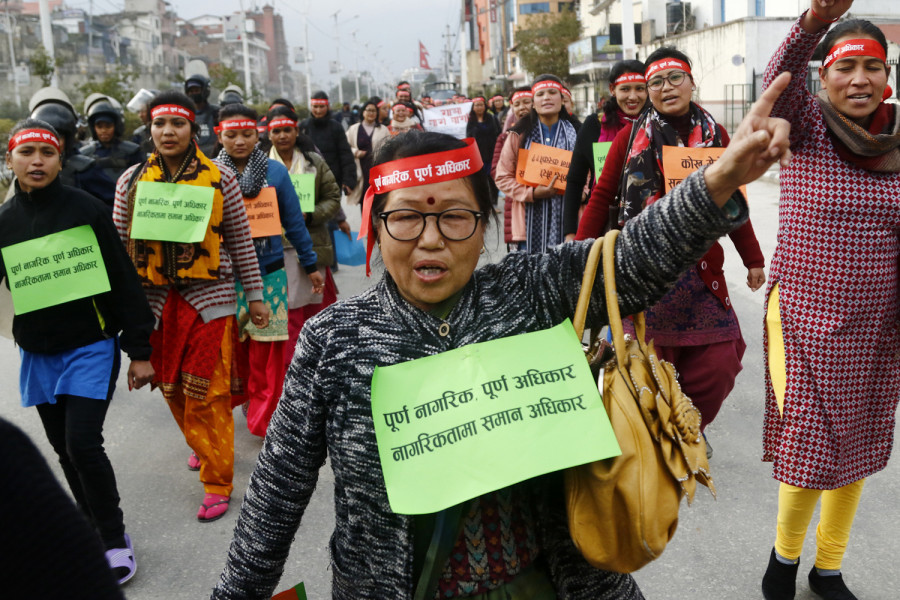National
Women rights organisations urge Human Rights Council to take up issue of women’s equality in citizenship rights
National Women Coalition has called for a revision in the constitution to redress discriminatory citizenship law.
Binod Ghimire
The National Women Coalition has called for an amendment to the Citizenship Act to ensure an equal right for women on the issue of citizenship.
The coalition, which comprises 44 organisations working for women’s rights, has requested the Human Rights Council to take up the issue of women’s citizenship rights in the upcoming Universal Periodic Review of the council slated for January next year.
The call for ensuring equality in citizenship rights comes amid controversy regarding the seven-year naturalisation period recommended for a foreigner woman married to a Nepali man to become a Nepali citizen.
“Amend the Constitution of Nepal to ensure equality before the law for women by guaranteeing full citizenship to women and the ability of women to transfer citizenship to their children,” the coalition has said.
The Nepal government in the last review in 2015 had accepted a number of recommendations related to equal citizenship rights; however, discriminatory legal provisions on acquisition, transfer and retention still exist, according to the coalition.
During the Nepal review five years ago, the government had noted the recommendation of the United States to consider revision in the constitution to allow women to convey their citizenship to their children and foreign spouses on an equal basis with men.
The government had also supported Hungary’s proposal to revise the citizenship laws to allow citizenship through either parent.
It had also supported Spain’s recommendation to ensure quality before the law for women by guaranteeing full citizenship to women and the ability of women to transfer citizenship to their children.
However, the government has not taken any initiative towards revision in the statute.
The latest move to revise the Citizenship Act-2006 has been criticised for being regressive.
Backtracking from previous provisions, the State Affairs and Good Governance Committee of Parliament in June endorsed an amendment bill on the Act with a provision that foreign women married to Nepali men will have to wait for seven years to acquire naturalised citizenship.
Despite the reservation from the main opposition Nepali Congress, Rastriya Janata Party, Nepal and Samajbadi Party, Nepal, the bill was endorsed with the majority votes after the ruling party strongly backed the bill.
The existing provision allows foreign women married to Nepali men to apply for citizenship immediately after they start the process to renounce their citizenship of origin.
Women’s rights advocates have said the issue of citizenship needs to be internationalised, as the political leadership in Nepal do not want to provide equal rights to the women.
Aruna Uprety, founding secretary of Women Rehabilitation Centre, said the Nepal Communist Party, which claims itself to be a progressive party, has proved to be the most regressive on the issue of citizenship.
“We cannot expect our leadership that has denied citizenship to Nepalis who have been living here for generations to be generous when it comes to the issue of naturalised citizenship,” Uprety told the Post.
She added hundreds of people, mainly from the marginalised communities like Dom and Musahar, still do not have citizenship.
The issue 0f providing naturalised citizenship to foreigner men married to Nepali women was raised during the discussion in the parliamentary committee, no party had strongly advocated for equal citizenship rights for a foreign women married to Nepali men.
Nepali Congress leaders like Gagan Thapa had publicly and in the party’s Central Working Committee had advocated for equal naturalisation period for foreigner men and women married to Nepali women and men, but their voices were unheard.
Some of the leaders argued that an amendment to the constitution is needed for providing naturalised citizenship to foreign men married to Nepali women as per Article 11 (6) of the constitution.
The article says, “A foreign woman who has a matrimonial relationship with a citizen of Nepal may if she so wishes, acquire the naturalised citizenship of Nepal as provided for in the Federal law.”
Nepal Communist Party leader Binda Pandey, a strong advocate of equal provision for citizenship, said the revision in the existing Citizenship Act is enough for providing citizenship to foreign men married to Nepali women. She added the constitution revision, as recommended in the Universal Periodic Review, however, is necessary to revise the discriminatory provisions in providing citizenship to the children born to Nepali women married to foreign men.
“The most important revision needs to take place in our discriminatory mindset,” she told the Post.




 18.12°C Kathmandu
18.12°C Kathmandu














